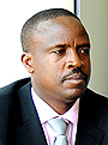“Always bear in mind, that your own resolution to succeed is more important than any other thing”, by Abraham Lincoln.There are various definitions of life skills, though my preference is the one which defines it as abilities for adaptive and positive behaviour that enable individuals to deal effectively with the demands and challenges of everyday life.


"Always bear in mind, that your own resolution to succeed is more important than any other thing”, by Abraham Lincoln.There are various definitions of life skills, though my preference is the one which defines it as abilities for adaptive and positive behaviour that enable individuals to deal effectively with the demands and challenges of everyday life. This definition goes on to say that life skills transform knowledge into positive behaviour. Life skills enable individuals to translate knowledge, attitudes and values into actual abilities. That is to say what to do and how to do it. By extension life skills become abilities that enable individuals to behave in healthy ways, given the desire, scope and opportunity to do so. Some core values of skills may include self awareness, empathy, problem solving skills, decision making abilities, creative thinking, critical thinking, interpersonal relationships, effective communication , dealing with emotions and coping with stress among others.The integration of life skills education in mainstream curriculum may be universal but the focus may vary depending on the context and local realities. A survey undertaken by the World Health Organization in 1999 found out that life skillsshould focus on empowering young people to cope with challenges that prevail in their respective societies.The same study found out that for example in Zimbabwe the focus was on HIV/AIDS, life skills initiative was on preventing child abuse in the UK while numerous life skills programs focused on the prevention of substance abuse and violence in the US.Similarly, in Rwanda life skills education could focus on initiatives that promote unity and reconciliation, fight genocide ideology, promote peace and co-existenceto mention a few. There is need to reform and re-orient traditional education system which appears to have become obsolete and out of step with the realities of modern social and economic life. Social problems such as pregnancies in schools and high rates of school drop-out which cripple the ability of school systems to achieve their academic goals can easily be overcome if students are empowered. Such skills can easily be taught to students through a life skills course. In addition to its wide-ranging applications in primary prevention and the advantages that it can bring for education systems, life skills education lays the foundation for learning skills that are in great demand in today’s job markets. Early childhood empowerment lays a cornerstone and solid foundation for the future and subsequent adult life- The earlier the child is empowered with life skills the better they become prepared for the future. The kind and quality of life and the way we behave are all a reflection of who and what we were and the kind of skills we acquired as young people, education having a very significant influence in the whole process.Last week, I was with a group of friends and somehow our conversation focused on why most of the time we go broke (run out of cash), we have no savings in our bank accounts despite working hard etc. Anyhow, one of us reminded us that one of the challenges we meet as adults are as a result of our past accumulated experiences both from family settings and education system we went through. It also dawned to us that we never learnt any money saving skills. We realized that most of us money and banking and saving skills for that matter was learn by doing encounter after we had started working! One of our friends who was from Kenya told us how they learnt the importance of life skills hard way after the disastrous effects of post 2007 election violence. It’s when they realised the importance of empowering children with problem solving skills, the peaceful need for co- existence in society, interpersonal skills and as a result life skills education was introduced as fully fledged course in Kenya’s education system. Without even referring to Kenya’s post election violence, we have our own dark past and challenges that necessitate integrated approach to prevent re-occurrence and encourage peaceful co-existence. Although the focus in this article focuses on life skills in school setting there is need for greater understanding of this concept beyond schools. There is need to identify the best strategies for supporting effective life skills initiatives to reach out-of-school children and adolescents.Lastly, it’s also imperative to note that development of life skills program is a dynamic and evolving process which should involve children, parents and local communities in the decision making process about the content and programs. In the meantime all eyes and hopes are on the new curriculum!! The writer is an educationist, author and publisher.




